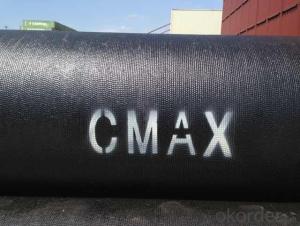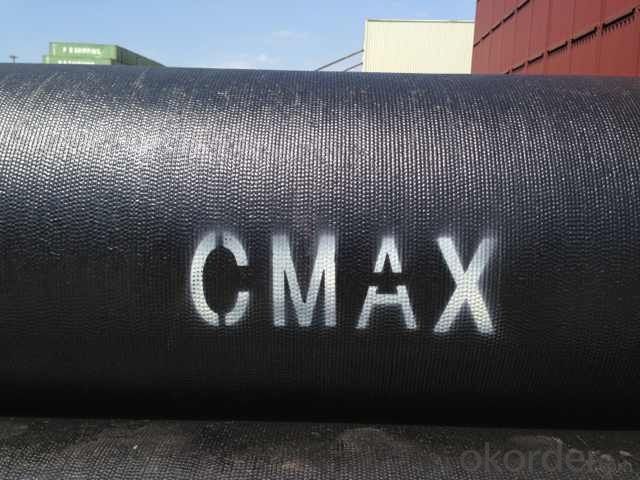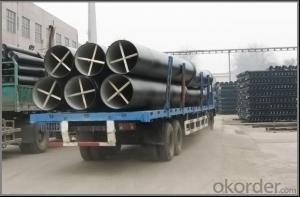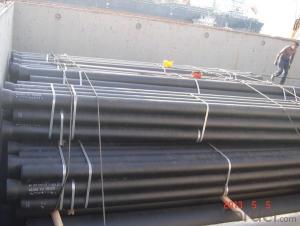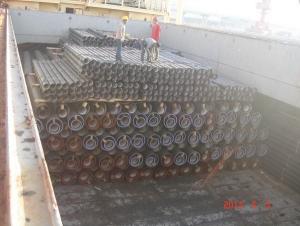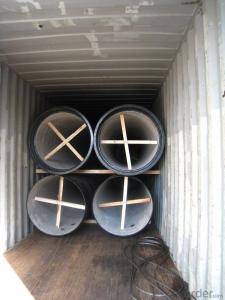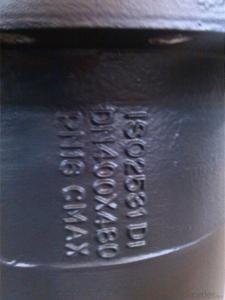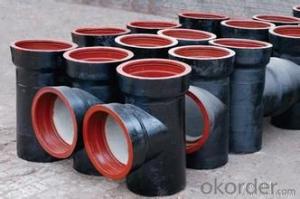DUCTILE IRON PIPE DN250 K7 CLASS
- Loading Port:
- Tianjin
- Payment Terms:
- TT OR LC
- Min Order Qty:
- -
- Supply Capability:
- 30000Tons m/month
OKorder Service Pledge
OKorder Financial Service
You Might Also Like
CNBM ductile iron pipe ranges from DN80-DN1600mm (T-Type, Class K9), effective length 6m, comply with ISO2531 Standard
Company Profile
CNBM International Corporation is the leading production base and renowned supplier of Ductile Iron Water Pipe systems of both potable and waste water in China. We are constantly looking to develop high quality products to ensure the longest service life and wonderful performance.
CNBM Pipelines regard quality as the essential factor leading to successful business. Every pipe is tested in accordance with BS EN545 (water application) or BS EN598 (sewer application). CNBM Pipelines products comply with and are tested according to the relevant European and International Standards. Our pipes are manufactured under the quality management system BS EN ISO 9001. After years of efforts, CNBM Pipelines has built up great reputation in terms of quality and service among customers worldwide
Product Introduction
CNBM ductile iron pipe ranges from DN80-DN1600mm (Tyton, T-Type, Class K7/K8/K9), effective length: 6m, complying with BS EN545/EN598/ISO2531/BS4772.
Specification& Payment terms
Internal lining: Pipes shall have an internal cement mortar lining in acc with ISO4179.
External coating: Pipes shall be externally coated with metallic zinc spray plus a further layer of resin painting to ISO8179.
Gasket: 100% SBR/NBR/EPDM gasket in accordance with ISO4633.
Packing: Pipes from DN100 to DN300 be bundled with steel belts, the others are in bulk.
Payment term: By 30% T/T advance payment + 70% Irrevocable L/C at sight.
Packing: In bulk vessel or in container.
- Q: Are ductile iron pipes suitable for installation in areas with high seismic activity?
- Ductile iron pipes are a suitable choice for installation in areas with high seismic activity. One of the key advantages of ductile iron pipes is their ability to withstand external loads and ground movement, making them ideal for seismic zones. Ductile iron pipes have excellent flexibility and high tensile strength, allowing them to withstand ground shifting and seismic forces without breaking or fracturing. Additionally, their high resistance to impact and stress make them less susceptible to damage during seismic events. Furthermore, ductile iron pipes have a proven track record of performance in seismic areas, as they have been successfully installed and used in earthquake-prone regions around the world for many years. They have demonstrated their ability to withstand the ground movements caused by seismic activity without compromising their structural integrity. Moreover, ductile iron pipes have the advantage of being highly durable and long-lasting, which is crucial in areas with high seismic activity where infrastructure needs to withstand frequent ground movements. Their longevity reduces the need for frequent maintenance and replacement, making them a cost-effective option in the long run. However, it is important to note that proper installation techniques and adherence to seismic design guidelines are essential to ensure the optimal performance of ductile iron pipes in high seismic areas. It is recommended to consult with experienced engineers and follow local building codes and regulations to ensure the pipes are installed correctly and can withstand the specific seismic conditions of the area. Overall, due to their flexibility, strength, durability, and proven performance, ductile iron pipes are considered suitable for installation in areas with high seismic activity.
- Q: How does ductile iron pipe perform in areas with high traffic loads?
- Areas with high traffic loads greatly benefit from the exceptional performance of ductile iron pipe. Its superior strength and durability enable it to effectively handle heavy loads and withstand the impact caused by vehicular traffic. Ductile iron pipes possess a high resistance to bending and cracking, making them an ideal choice for applications in roadways, highways, and other areas with high traffic. The ability of ductile iron pipe to distribute weight and pressure exerted by heavy traffic loads is a result of its high strength. This reduces the risk of deformation or failure, making it a reliable option for transporting water, sewage, and other fluids in areas commonly frequented by heavy vehicles. Moreover, ductile iron pipe displays excellent corrosion resistance, further enhancing its performance in high traffic areas. It can withstand exposure to various environmental conditions, such as moisture, chemicals, and abrasion, without compromising its structural integrity. This durability translates into minimal maintenance requirements and a long service life, making it a cost-effective solution. In addition, the smooth internal surface of ductile iron pipe minimizes friction and allows for efficient flow of liquids. This reduces energy consumption and maximizes the hydraulic capacity of the pipe, which is particularly advantageous in areas with high traffic loads where the demand for water or wastewater transportation is often high. To summarize, ductile iron pipe is a reliable and durable choice for areas with high traffic loads. Its strength, resistance to bending and cracking, corrosion resistance, and efficient flow characteristics make it an excellent option for transportation systems in roadways, highways, and other heavily trafficked areas.
- Q: Is nodular cast iron pipe filled with Yau Ma Tei?
- In many areas of our country, ductile iron pipe in the middle and small diameter to tube connected with the tube, the bearing type or flange interface method; ductile iron, angle limit must be allowed better seismic performance and sealing performance.
- Q: What are the recommended bedding and backfill materials for ductile iron pipe?
- The recommended bedding and backfill materials for ductile iron pipe typically include a layer of granular material, such as sand or pea gravel, for bedding and a layer of compacted soil or select backfill material for backfilling. This helps to distribute load and protect the pipe from external forces while maintaining stability and preventing damage.
- Q: Can ductile iron pipes be used for water supply in buildings?
- Yes, ductile iron pipes can be used for water supply in buildings. Ductile iron pipes are known for their strength, durability, and corrosion resistance, making them suitable for a variety of applications, including water supply systems. They have a high tensile strength and can withstand high-pressure environments, making them ideal for delivering water to buildings. Additionally, ductile iron pipes have a long service life, reducing the need for frequent replacements. They also have good flow characteristics, allowing for efficient water distribution within the building. Therefore, ductile iron pipes are a reliable and commonly used choice for water supply systems in buildings.
- Q: A tube is used only in ductile iron pipes, isn't it?
- Compared with the PE pipe, from the installation time, ductile pipe PE pipe installation is simple and rapid, and after the installation of internal and external pressure bearing better tightness and corrosion resistance; from the point of view, ductile pipe sealing better after installation, but also can improve the corrosion resistance of corrosion protection through a variety of means; from the hydraulic performance, because ductile pipe specifications generally refers to the inner diameter of PE pipe diameter specifications generally refers to the same specifications, because under the condition of ductile pipe can achieve greater runoff; from the installation and maintenance cost, ductile pipe have more favorable price. The main components of ductile iron pipes are carbon, silicon, manganese, sulfur, phosphorus and magnesium. The inner wall of zinc spray, anti-corrosion materials such as cement mortar.
- Q: How are ductile iron pipes connected or jointed together?
- Ductile iron pipes are typically connected or jointed together using various methods such as flanged joints, push-on joints, mechanical joints, or restrained joints. These methods ensure a secure and leak-free connection between the pipes, providing a reliable and durable pipeline system.
- Q: Do rigid cement cast iron pipes need cement piers?
- Ductile weakness: ductile cast iron pipes connected by human factors such as the operation level of responsibility, influence, construction not convenient. The advantages of PE PE PE pipe has good corrosion resistance and its anti inorganic performance than that of the metal pipe is much stronger in the buried without corrosion, construction convenient. Small diameter PE pipe in the price performance ratio is better than that of steel and ductile iron.PE tube have disadvantages: benzene, gasoline, carbon tetrachloride and other organic solvents have certain effect on pe. If the organic solvent is infiltrated into the polyethylene, the swelling will occur, and its physical properties will be decreased. Its pressure resistance and temperature resistance are poor.
- Q: Are ductile iron pipes resistant to frost heave?
- Yes, ductile iron pipes are generally resistant to frost heave due to their strong and flexible nature.
- Q: How do ductile iron pipes handle pipe deflection?
- Ductile iron pipes are known for their exceptional strength and flexibility, which allows them to handle pipe deflection effectively. Pipe deflection refers to the bending or curving of a pipe from its original straight alignment. When subjected to external forces, such as soil movement or heavy loads, ductile iron pipes have the ability to flex and adjust without fracturing or breaking. This is due to their unique composition, which includes nodular graphite inclusions that provide excellent ductility. The flexibility of ductile iron pipes enables them to absorb and distribute stress evenly along the pipe wall, preventing concentrated points of strain that could lead to failure. This characteristic allows the pipes to accommodate ground movement, settlement, and other external factors that may cause deflection. Additionally, ductile iron pipes have a high modulus of elasticity, which means they can withstand significant deformation before reaching their ultimate limit. This property allows the pipes to maintain their structural integrity even when subjected to substantial deflection. Furthermore, the joint system used in ductile iron pipe installations contributes to their ability to handle pipe deflection. The restrained joint design ensures a tight and secure connection between pipe sections, reducing the potential for joint separation or leakage under deflection-induced stress. Overall, ductile iron pipes have excellent resistance to pipe deflection. Their flexibility, high modulus of elasticity, and reliable joint system make them a preferred choice for various applications, including water distribution, wastewater management, and sewer systems.
Send your message to us
DUCTILE IRON PIPE DN250 K7 CLASS
- Loading Port:
- Tianjin
- Payment Terms:
- TT OR LC
- Min Order Qty:
- -
- Supply Capability:
- 30000Tons m/month
OKorder Service Pledge
OKorder Financial Service
Similar products
Hot products
Hot Searches
Related keywords
